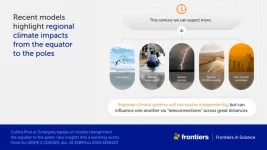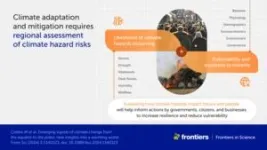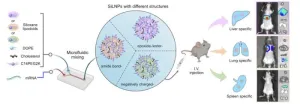(Press-News.org) The effects of climate change are not distant future scenarios or confined to remote parts of the world—they are unfolding now, right in our own backyards. In 2023, extreme weather events impacted communities across every inhabited continent, causing major flooding, droughts, and wildfires.
While worldwide changes, such as increases in global mean temperature, often dominate discussions of mitigation actions, a detailed understanding of the regional impacts of a warming world is crucial for protecting communities from escalating risks. A team of researchers writing in Frontiers in Science synthesized results from multiple new studies to provide a clearer picture of these regional climate change impacts.
"We are constantly advancing our understanding of climate change, particularly its regional aspects, to inform policies aimed at adaptation,” said first author Matthew Collins of the University of Exeter, UK. “While global aspects remain important, humanity will feel the impact of climate change at the regional level. This is where infrastructure planning, extreme event preparedness, and management of public health and food security need to up-to-date climate science."
Regional impacts and rising risks
The study revealed a range of emerging climate change signals at the local level that are likely to occur this century, spanning from the equator to the poles.
In tropical and subtropical regions, dramatic changes in precipitation are expected to significantly alter monsoon intensity, leading to substantial societal impacts. Monsoon systems, which are critical for agriculture, directly affect billions of people. Approximately 60% of the world’s population resides in the northern hemisphere monsoon regions, where the summer monsoon season can deliver up to 80% of the annual rainfall. As aerosol emissions decrease and greenhouse gases rise, monsoons are predicted to become more intense, potentially resulting in floods, landslides, and reduced agricultural yields.
In the mid-latitudes, high-resolution climate models indicate a potential strengthening of storm tracks into northwestern Europe, increasing the risk of extreme weather.
"Increased monsoon precipitation and storm track rainfall variability can lead to droughts in some regions and high winds and flooding in others, resulting in devastating impacts on agriculture, essential infrastructure, and the overall health of communities,” said co-author Vikki Thompson, from the Koninklijk Nederlands Meteorologisch Instituut, the Netherlands.
In polar regions, projections show that a greater fraction of precipitation will fall as rain rather than snow, potentially accelerating ice melt and amplifying sea-level rise. This transition endangers coastal communities worldwide. Moreover, changes at the poles are not confined to those regions. Polar amplification, which refers to the phenomenon in which the poles warm faster than the rest of the planet, can influence weather patterns in the mid-latitudes, potentially altering storm tracks.
Enhanced climate models can improve regional adaptation and resilience
The study calls for a concerted, interdisciplinary effort in the scientific and policy communities to bridge the gaps in climate modeling. Higher-resolution data, integration of machine learning techniques, and new models will improve the simulation of complex climate phenomena at both global and regional levels. According to Eunice Lo, co-author from the University of Bristol, UK, such advancements are vital for informing international climate policies and ensuring that local adaptation measures—such as resilient infrastructure, enhanced early-warning systems, and sustainable agricultural practices—are based on the most reliable and precise data.
“Regional information is essential for preparing for these extreme events and implementing effective, science-led adaptation measures," added co-author Matt Priestley, also from the University of Exeter. "Without investments into advanced climate modeling and monitoring systems, policymakers and local communities are left navigating climate risks with insufficient information, which can lead to inadequate or misdirected efforts."
END
Understanding regional climate change is essential for guiding effective climate adaptation policy, study finds
From intensified monsoons and storm tracks to polar precipitation shifts, a new synthesis of regional climate data emphasizes the need for climate adaptation policy based on the latest regional climate science.
2024-10-01
ELSE PRESS RELEASES FROM THIS DATE:
New AI model efficiently reaches clinical-expert-level accuracy in complex medical scans
2024-10-01
UCLA researchers have developed a deep-learning framework that teaches itself quickly to automatically analyze and diagnose MRIs and other 3D medical images – with accuracy matching that of medical specialists in a fraction of the time. An article describing the work and the system’s capabilities is published in Nature Biomedical Engineering.
Unlike the few other models being developed to analyze 3D images, the new framework has wide adaptability across a variety of imaging modalities. The developers have studied it with 3D retinal scans (optical coherence tomography) for disease ...
Cool roofs could have saved lives during London’s hottest summer
2024-10-01
As many as 249 lives could have been saved in London during the 2018 record-setting hot summer had the city widely adopted cool roofs, estimates a new study by researchers at UCL and the University of Exeter.
The paper, published in Nature Cities, analysed the cooling effect that roofs painted white or other reflective colours would have on London’s ambient temperature between June and August 2018, the city’s hottest summer. From June through August, the average temperature around London was 19.2 degrees C, about ...
Solidarity drives online virality in a nation under attack, study of Ukrainian social media reveals
2024-10-01
While divisive social media posts get more traction in countries such as the US, a new study shows that celebrating national unity is the way to go viral in Ukraine.
“Ingroup solidarity” statements got far more likes and shares than hostile posts about Russians – a trend that only grew stronger in the wake of the invasion.
The first major study of social media behaviour during wartime has found that posts celebrating national and cultural unity in a country under attack receive significantly more online engagement than derogatory posts about the aggressors.
University of Cambridge psychologists analysed a total of 1.6 million ...
Research heralds new era for genetics
2024-10-01
UNDER STRICT EMBARGO UNTIL 10AM (UK TIME) ON TUESDAY 1 OCTOBER 2024.
Peer reviewed | Observational study | People
Research led by scientists at Queen Mary University of London is heralding in a new era for genetic sequencing and testing.
In the largest study of its kind to date, published today in Nature Medicine, an international group of researchers led by Queen Mary used new bioinformatics techniques to scan the genetic profiles of 80,000 people to understand the frequency of specific expansions of short repetitive DNA sequences in the general population.
These expansions are the most common cause of inherited neurological ...
Deep brain stimulation instantly improves arm and hand function post-brain injury
2024-10-01
Deep brain stimulation may provide immediate improvement in arm and hand strength and function weakened by traumatic brain injury or stroke, University of Pittsburgh School of Medicine researchers report today in Nature Communications.
Encouraging results from extensive tests in monkeys and humans open a path for a new clinical application of an already widely used brain stimulation technology and offer insights into neural mechanisms underlying movement deficits caused by brain injury.
“Arm and hand paralysis significantly impacts the quality ...
Siloxane nanoparticles unlock precise organ targeting for mRNA therapy
2024-10-01
Penn Engineers have discovered a novel means of directing lipid nanoparticles (LNPs), the revolutionary molecules that delivered the COVID-19 vaccines, to target specific tissues, presaging a new era in personalized medicine and gene therapy.
While past research — including at Penn Engineering — has screened “libraries” of LNPs to find specific variants that target organs like the lungs, this approach is akin to trial and error. “We’ve never understood how the structure of one key component of the LNP, ...
Building better solar cells: assembly of 2D molecular structures with triptycene scaffold
2024-10-01
Research in the field of material science and electronics relies on the innovative arrangement of molecules or atoms to develop materials with unique properties not found in conventional materials. Two-dimensional (2D) assemblies of π-electronic systems, arranged in thin layers, are becoming increasingly important in the fields of materials science and organic electronics. Their unique arrangement allows for specific electronic and physical properties, making them ideal for applications like solar cells, and flexible displays. However, creating such assemblies is challenging because it often requires special designs and techniques for each ...
Maybe we shouldn’t even call low-grade prostate cancer “cancer”
2024-10-01
A new paper in the Journal of the National Cancer Institute, published by Oxford University Press, indicates that patients may benefit if doctors stop calling certain early-stage changes to the prostate “cancer” at all.
Prostate cancer is the second leading cause of cancer death worldwide in men, but far more patients are diagnosed than die of the disease. In 2022, there were nearly 1.5 million cases of prostate cancer, but only 400,000 deaths. Low-grade prostate cancer, commonly known as GG1 among physicians, virtually never metastasizes or causes symptoms. Some medical researchers have wondered recently if it would be a benefit ...
‘Cheeky’ discovery allows scientists to estimate your risk of dying using cells found in the mouth
2024-10-01
We don’t all age at the same rate. But while some supercentenarians may age exceptionally slowly due to winning the genetics jackpot, a plethora of behavioral and lifestyle factors are known to speed up aging, including stress, poor sleep, poor nutrition, smoking, and alcohol. Since such environmental effects get imprinted on our genome in the form of epigenetic marks, it is possible to quantify molecular aging by characterizing the epigenome at prognostic genomic sites.
Over the past decade, scientists have developed several such ‘epigenetic clocks’, calibrated against chronological age and various lifestyle factors across large ...
ChatGPT shows human-level assessment of brain tumor MRI reports
2024-10-01
As artificial intelligence advances, its uses and capabilities in real-world applications continue to reach new heights that may even surpass human expertise. In the field of radiology, where a correct diagnosis is crucial to ensure proper patient care, large language models, such as ChatGPT, could improve accuracy or at least offer a good second opinion.
To test its potential, graduate student Yasuhito Mitsuyama and Associate Professor Daiju Ueda’s team at Osaka Metropolitan University’s Graduate ...
LAST 30 PRESS RELEASES:
Science reveals why you can’t resist a snack – even when you’re full
Kidney cancer study finds belzutifan plus pembrolizumab post-surgery helps patients at high risk for relapse stay cancer-free longer
Alkali cation effects in electrochemical carbon dioxide reduction
Test platforms for charging wireless cars now fit on a bench
$3 million NIH grant funds national study of Medicare Advantage’s benefit expansion into social supports
Amplified Sciences achieves CAP accreditation for cutting-edge diagnostic lab
Fred Hutch announces 12 recipients of the annual Harold M. Weintraub Graduate Student Award
Native forest litter helps rebuild soil life in post-mining landscapes
Mountain soils in arid regions may emit more greenhouse gas as climate shifts, new study finds
Pairing biochar with other soil amendments could unlock stronger gains in soil health
Why do we get a skip in our step when we’re happy? Thank dopamine
UC Irvine scientists uncover cellular mechanism behind muscle repair
Platform to map living brain noninvasively takes next big step
Stress-testing the Cascadia Subduction Zone reveals variability that could impact how earthquakes spread
We may be underestimating the true carbon cost of northern wildfires
Blood test predicts which bladder cancer patients may safely skip surgery
Kennesaw State's Vijay Anand honored as National Academy of Inventors Senior Member
Recovery from whaling reveals the role of age in Humpback reproduction
Can the canny tick help prevent disease like MS and cancer?
Newcomer children show lower rates of emergency department use for non‑urgent conditions, study finds
Cognitive and neuropsychiatric function in former American football players
From trash to climate tech: rubber gloves find new life as carbon capturers materials
A step towards needed treatments for hantaviruses in new molecular map
Boys are more motivated, while girls are more compassionate?
Study identifies opposing roles for IL6 and IL6R in long-term mortality
AI accurately spots medical disorder from privacy-conscious hand images
Transient Pauli blocking for broadband ultrafast optical switching
Political polarization can spur CO2 emissions, stymie climate action
Researchers develop new strategy for improving inverted perovskite solar cells
Yes! The role of YAP and CTGF as potential therapeutic targets for preventing severe liver disease
[Press-News.org] Understanding regional climate change is essential for guiding effective climate adaptation policy, study findsFrom intensified monsoons and storm tracks to polar precipitation shifts, a new synthesis of regional climate data emphasizes the need for climate adaptation policy based on the latest regional climate science.





